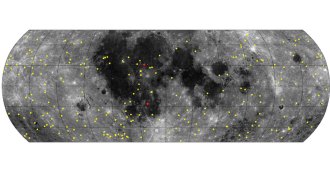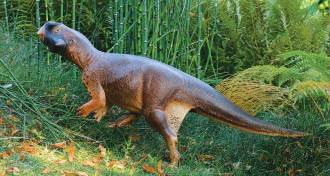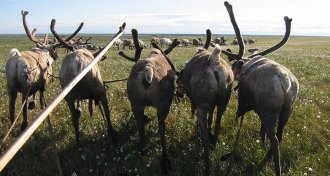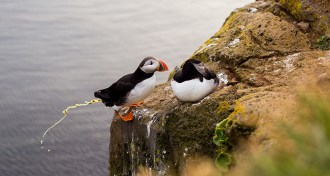All Stories
-
 Science & Society
Science & SocietyReaders respond to the SN 10, and awards for Science News
The human side of science, cool cloth and more in reader feedback.
-
 Science & Society
Science & SocietyAverages can conceal how people and science learn
Editor in chief Eva Emerson discusses getting the whole scientific story.
By Eva Emerson -
 Astronomy
AstronomySurprising number of meteoroids hit moon’s surface
A new analysis of lunar images reveals over 200 new craters and about 47,000 undiscovered “splotches” on the moon.
-
 Health & Medicine
Health & MedicineChinese patient is first to be treated with CRISPR-edited cells
Researchers used CRISPR/Cas9 to engineer immune cells that were then injected into a patient with lung cancer, the journal Nature reports.
-
 Paleontology
PaleontologyDinosaurs may have used color as camouflage
Fossilized pigments could paint a vivid picture of a dinosaur’s life.
By Meghan Rosen -
 Animals
AnimalsSkimpy sea ice linked to reindeer starvation on land
Unseasonably scant sea ice may feed rain storms inland that lead to ice catastrophes that kill Yamal reindeer and threaten herders’ way of life.
By Susan Milius -
 Climate
ClimateSkimpy sea ice linked to reindeer starvation on land
Unseasonably scant sea ice may feed rain storms inland that lead to ice catastrophes that kill Yamal reindeer and threaten herders’ way of life.
By Susan Milius -
 Neuroscience
NeuroscienceSounds and glowing screens impair mouse brains
Too much light and noise screws up developing mice’s brains.
-
 Health & Medicine
Health & MedicineRestless sleep associated with heart rhythm problems
Poor sleep, even without apnea, is tied to heart rhythm problems.
By Laura Beil -
 Tech
TechDouble-charging material makes a run in the sun extra powerful
Textile stores energy from the sun and a person’s movements to power devices.
-
 Climate
ClimateThere’s something cool about Arctic bird poop
Ammonia from seabird poop helps brighten clouds in the Arctic, slightly cooling the region’s climate.
-
 Climate
ClimateCO2 emissions stay steady for third consecutive year
Global emissions of carbon dioxide from human activities will probably see almost no increase in 2016 despite economic growth.